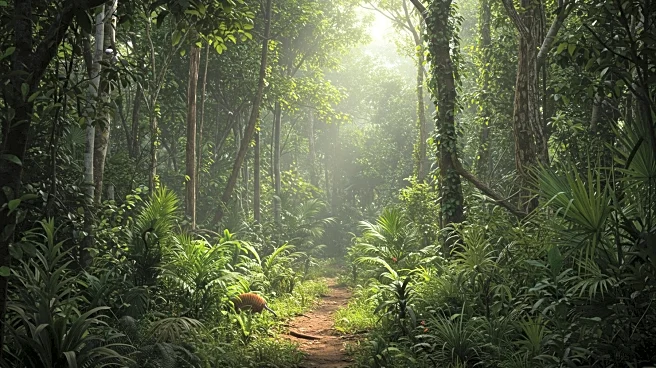What is the story about?
What's Happening?
Mexico, Guatemala, and Belize have unveiled plans to establish a significant nature reserve, the Great Mayan Jungle Biocultural Corridor, spanning over 14 million acres across the three countries. This initiative aims to protect the tropical forest from criminal activities and environmental degradation. The reserve will be the second largest in the Americas, following the Amazon. The environment ministers of Mexico and Guatemala have emphasized the need for increased security to reclaim the area from organized crime, which has been exploiting the region for illegal activities such as drug trafficking and logging. The plan includes involving local communities as allies by providing economic alternatives, such as Mexico's 'Planting Life' program, which incentivizes tree planting. However, this program has faced criticism for inadvertently promoting deforestation in some areas.
Why It's Important?
The creation of this vast reserve is crucial for preserving biodiversity and combating climate change. It represents a significant step in protecting one of the world's most important ecological regions. The initiative also addresses the socio-economic challenges faced by local communities, offering them sustainable economic opportunities. By involving local populations, the plan aims to reduce the influence of organized crime, which has historically exploited these areas. The success of this initiative could serve as a model for other regions facing similar challenges, highlighting the importance of integrating environmental conservation with community development.
What's Next?
The three countries have formed a committee to develop a roadmap for the reserve, which will outline the roles of various institutions and funding mechanisms. They aim to secure approximately $6 million to initiate the project. The governments have also agreed to establish a council, including environmental authorities and an Indigenous advisory council, to oversee any proposed projects within the reserve. This council will ensure that future developments align with conservation goals. The initiative's progress will depend on the continued commitment of the involved governments and the effective engagement of local communities.
Beyond the Headlines
The initiative raises important questions about balancing development and conservation. The involvement of Indigenous communities and the emphasis on sustainable economic alternatives highlight a shift towards more inclusive environmental policies. However, skepticism remains regarding the long-term commitment of the governments, especially given past controversies like the Maya Train project. The success of this initiative could influence future conservation efforts globally, emphasizing the need for collaborative approaches that integrate environmental, social, and economic considerations.















